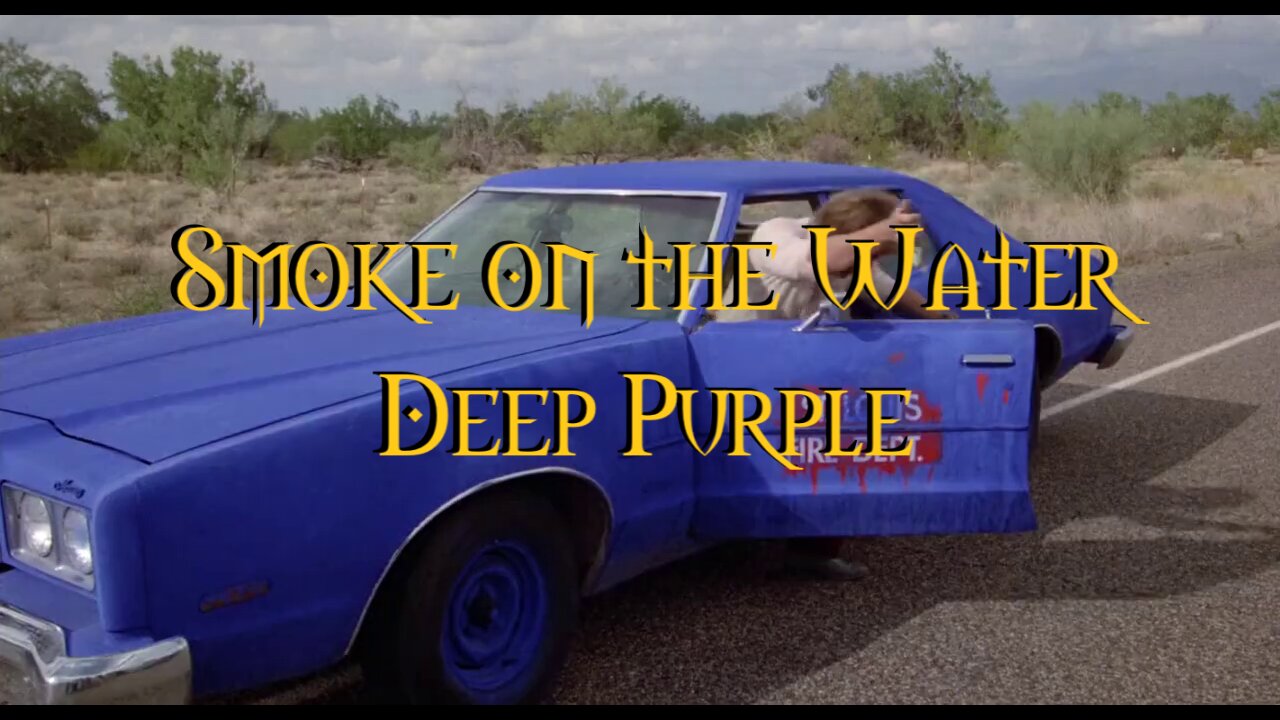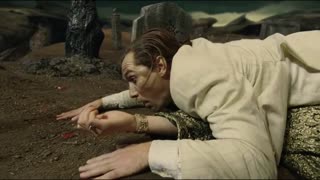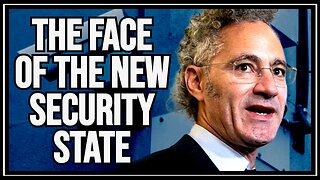Premium Only Content

Smoke on the Water Deep Purple
This song took inspiration from a fire in the Casino at Montreux, Switzerland on December 4, 1971. The band was going to start recording their Machine Head album there right after a Frank Zappa concert, but someone fired a flare gun at the ceiling during Zappa's show, which set the place on fire.
Deep Purple was in the audience for the show, and lead singer Ian Gillan recalls two flares being shot by someone sitting behind him that landed in the top corner of the building and quickly set it ablaze. Zappa stopped the show and helped ensure an orderly exit.
Deep Purple watched the blaze from a nearby restaurant, and when the fire died down, a layer of smoke had covered Lake Geneva, which the casino overlooked. This image gave bass player Roger Glover the idea for a song title: "Smoke On The Water," and Gillan wrote the lyric about their saga recording the Machine Head album.
The band was relocated to the Grand Hotel in Montreux, where they recorded the album using the Rolling Stones' mobile studio. They needed one more song, so they put together "Smoke On The Water" using Gillan's lyric and the riff guitarist Ritchie Blackmore came up with. The result was a song telling the story of these strange events just days after they happened - the recording sessions took place from December 6-21.
In an interview with Gillan, he explained: "We set the gear up in the hallways and the corridors of the hotel, and the Rolling Stones' mobile truck was out back with very long cables coming up through the windows. We tried to re-create an atmosphere in a technical sense the best we could. And when we went to write the lyrics, because we were short on material, we thought it was an 'add-on track.' It was just a last-minute panic.
So, the riff and backing track had been recorded on the first day as a kind of soundcheck. There were no lyrics. The engineer told us on the last day, 'Man, we're several minutes short for an album.' So, we dug it out, and Roger and I wrote a biographical account of the making of the record: 'We all came out to Montreux...'"
The session where they put down the backing track took place at a dance club in Montreux called the Pavilion, where they tried to record after the casino burned down. The "Smoke On The Water" track was all they accomplished there because locals complained about the noise and police shut them down. The rest of the album, and the "Smoke On The Water" vocal, was recorded at the Grand Hotel.
Frank Zappa, who is mentioned in the lyrics, lost all his equipment in the fire. He then broke his leg a few days later when a fan pulled him into the crowd at a show in England. This prompted Ian Gillan to say "Break a leg, Frank," into the microphone after recording this for a BBC special in 1972.
Deep Purple bass player Roger Glover had some doubts about the title: he knew it was great but was reluctant to use it because it sounded like a drug song.
Ritchie Blackmore has an affinity for renaissance music, which he writes and performs in his duo Blackmore's Night. He says that he first took an interest in the form in 1971 when he saw a BBC program called Wives of Henry VIII, and that there is indeed a trace of Renaissance in "Smoke On The Water." "The riff is done in fourths and fifths - a medieval modal scale," he explained on MySpace Music. "It makes it appear more dark and foreboding. Not like today's pop music thirds."
The band did not think this would be a hit and rarely played it live. When they did, though, it got a huge reaction. They included a live version from a show in Osaka on their 1972 live album Made In Japan, which was a huge seller. The album was released in America in April 1973, over a year after Machine Head was released there. This earned the song a lot more exposure and convinced Deep Purple's people to release it as a single in America in May. The song didn't peak at #4 in the US until July 28, 1973; by this time, Deep Purple had another album out (Who Do We Think We Are) and the Mark II lineup that recorded the song had broken apart, with Ian Gillan and Roger Glover leaving the band.
"Funky Claude," as in the lyrics "Funky Claude was running in and out pulling kids out the ground," is Claude Nobs, a man who helped rescue some people in the fire and found another hotel for the band to stay. He is the co-founder of the prestigious Montreux Jazz Festival.
Nobs explained to Gibson.com how this song arose out of the ashes: "Deep Purple were watching the whole fire from their hotel window, and they said, 'Oh my God, look what happened. Poor Claude and there's no casino anymore!' They were supposed to do a live gig [at the casino] and record the new album there. Finally I found a place in a little abandoned hotel next to my house and we made a temporary studio for them. One day they were coming up for dinner at my house and they said, 'Claude we did a little surprise for you, but it's not going to be on the album. It's a tune called "Smoke On The Water.'" So I listened to it. I said, 'You're crazy. It's going to be a huge thing.' Now there's no guitar player in the world who doesn't know [he hums the riff]. They said, 'Oh if you believe so we'll put it on the album.' It's actually the very precise description of the fire in the casino, of Frank Zappa getting the kids out of the casino, and every detail in the song is true. It's what really happened. In the middle of the song, it says 'Funky Claude was getting people out of the building,' and actually when I meet a lot of rock musicians, they still say, 'Oh here comes Funky Claude.'"
The B-side of the single was another version of the song, recorded live in Japan.
In 1989, former members Ritchie Blackmore and Ian Gillan released a new version of this with Robert Plant, Brian May, and Bruce Dickinson. They called the project "Rock Aid Armenia," with proceeds going to victims of the Armenian earthquake.
Fender.com asked Ritchie Blackmore how he came up with the song's famous riff. He replied: "Ian Paice (Deep Purple drummer) and I often used to jam, just the two of us. It was a natural riff to play at the time. It was the first thing that came into my head during that jam."
Deep Purple went through a number of lineup changes, but "Smoke On The Water" stayed in their setlist because it was too popular not to play. After lead singer Ian Gillan left in 1973, David Coverdale got to sing it. Tommy Bolin was tasked with playing it on guitar when he took over for Blackmore in 1975. Blackmore was back in Deep Purple from 1984-1993; in 1994, Steve Morse became their new guitarist. When Songfacts spoke with Steve Morse about performing this song live, he said: "On a tune that I didn't write like 'Smoke On The Water,' I try to tread a line between homage and respect and originality. So, say, on the solo, I take it a out a little bit and do it my way for a little bit, and then bring it back to more like the original, and wrap it up with a lick that everybody would recognize. That's about as much as I can suggest somebody do because there's ingrained memories of the song in peoples' minds."
The famous guitar riff is performed in the 2003 Jack Black film School Of Rock.
On June 3, 2007 in Kansas City, Kansas, 1,721 guitarists gathered to play this song together and break the record for most guitarists playing at one time. The entire song was played, though only the one lead guitar played the solo. Guitarists from as far as Scotland came out for the event. The event was organized by radio station KYYS, whose DJ, Chris, gave us this account: "It was so exhilarating that I got chills when every guitarist played the final riff, lifted their guitars into the air, and defined rock in Kansas City."
It's hard to compete with outsourcing, however, and the record was beaten on October 26, 2007 when 1,730 guitarists gathered in Shillong, India, to perform "Knocking On Heaven's Door."
This was used in commercials for Dodge trucks. The song plays on a jukebox that a guy is eyeing in an antique store. His wife gets her way and they take home a piece of furniture instead - the point being the large payload capacity of the truck.
According to an interview with Ian Gillian on VH1's Classic Albums: Machine Head, the band did not have much money when recording this album and were renting a recording studio. They stayed past when they were supposed to get out. As they were recording this song, the police were knocking on the door of the studio to kick them out.
In a 2008 survey of students from music schools across London, this topped a poll to find the best ever guitar riff. Nirvana's "Smells Like Teen Spirit" came second and Aerosmith's "Walk This Way" third.
According to the London Times newspaper, Ritchie Blackmore was embarrassed to present this song to his fellow members of Deep Purple because it was such a Neanderthal tune for a guitarist of his caliber to come up with.
The lyrics, "Swiss time was running out" meant that their visas were going to expire soon. They wrote the songs and recorded them in a matter of weeks.
Many beginners try to play this when they pick up a guitar, and they usually play it wrong. Here's how: Use the open G and D strings as the starting point and you pluck the strings with a finger each, not a pick. Lots of people play this from the 5th fret of the A and D string, which is wrong.
In the 2002 "Weekend at Burnsie's" episode of The Simpsons, Homer is heard crooning to this song after he uses medicinal marijuana.
In Stephen King's Dreamcatcher (2001), a character recalls losing his virginity to this song at a fraternity party.
Pat Boone covered this on In a Metal Mood in 1997. On the album, he performed heavy metal songs with string instruments and pianos, but in this case kept the famous guitar riff and even allowed a solo. Otherwise, it's a very jazzy cover.
In a Songfacts interview with Boone, he said: "Ritchie Blackmore played some guitar on my recording - of his song. He had to do it to a track we sent him in Germany where he was recording in some castle. He played part of the guitar licks on 'Smoke on the Water,' but the other part is Dweezil Zappa, on a Hendrix Stratocaster. It was very authentic. I was very serious about treating these songs as good music - with big band jazz arrangements."
Talking about the song's merits as live material, Roger Glover said in Metal Hammer, "I think 'Smoke On The Water' is the biggest song that Purple will ever have and there's always a pressure to play it, and it's not the greatest live song, it's a good song but you sorta plod through it. The excitement comes from the audience. And there's always the apprehension that Ritchie (Blackmore) isn't gonna want to do it, 'cause he's probably fed up with doing it."
-
 4:20
4:20
Psychological operations
1 day agoOnce In A Lifetime The Talking Heads
12 -
 2:02:24
2:02:24
Side Scrollers Podcast
19 hours agoThe BIGGEST FLOP of 2025 | Side Scrollers Live
43.7K5 -
 14:05
14:05
Dr Disrespect
17 days agoDRDISRESPECT Takes Over BATTLEFRONT 2
13.2K8 -
 3:29:07
3:29:07
The Pascal Show
18 hours ago $4.18 earnedDIDDY TRIAL LIVE! KANYE IN THE BUILDING! Assistant Jonathan Perez Testifies! Diddy Trial Day 23
15.4K2 -
 8:17
8:17
Due Dissidence
16 hours agoPalantir is a CREATION of Post-9/11 Hysteria - w/ Derrick Broze | TMWS
9.43K6 -
 7:00
7:00
Zach Costello
18 hours agoMedia CAUGHT Covering Up ATTACK on Homeland Security Secretary
11.7K9 -
 12:05
12:05
Matt Kohrs
18 hours agoHow I Became A Profitable Trader (3 Simple Steps)
9.48K -
 5:22:44
5:22:44
GloryJean
20 hours agoMnK #1 Aggressive POV 🖱️ 6.7 K/D
15.2K -
 9:03
9:03
PragerU
14 hours agoAnti-ICE Organizers Exposed, U.S.–China Deal Reached, Hamas Kills Humanitarians: 6/13/25
12.7K2 -
 24:06
24:06
This Bahamian Gyal
14 hours agoEven BLACK PEOPLE are fed-up with BLACK PEOPLE
17.2K14